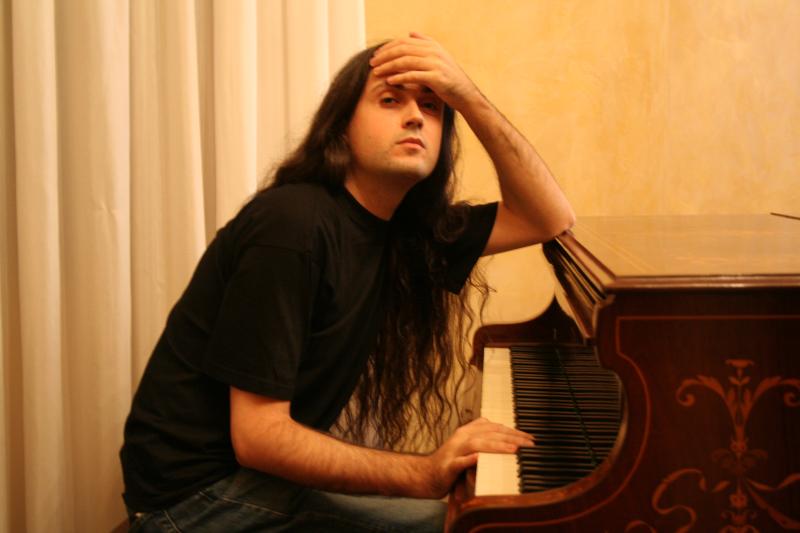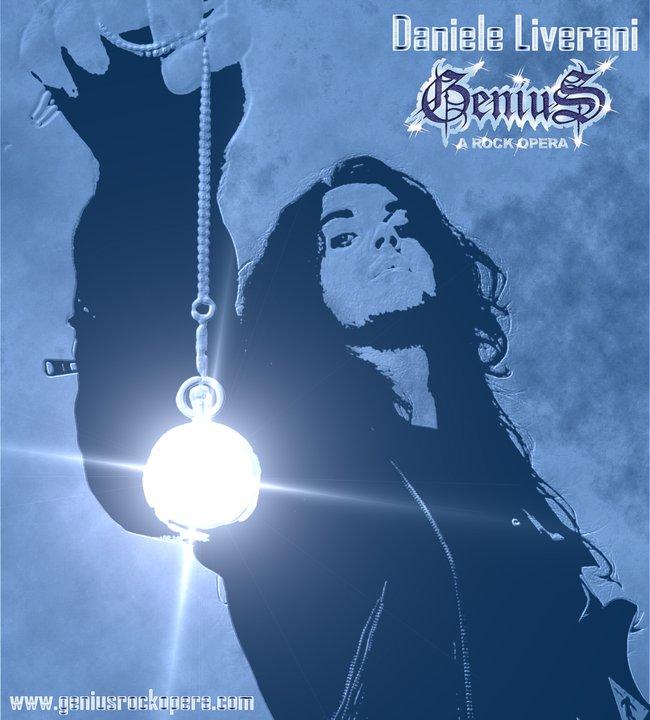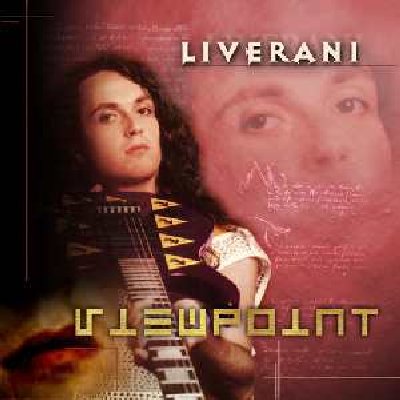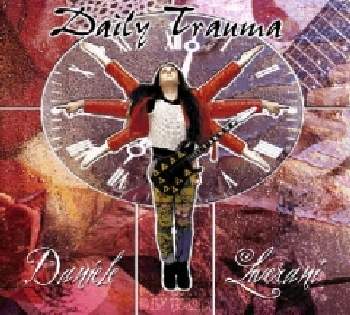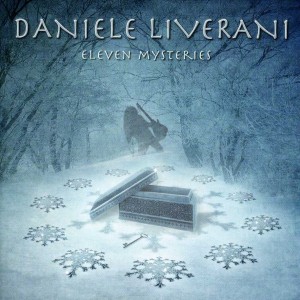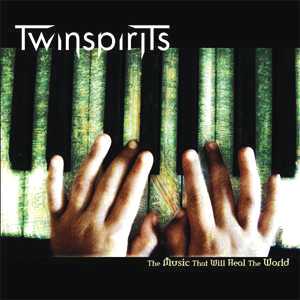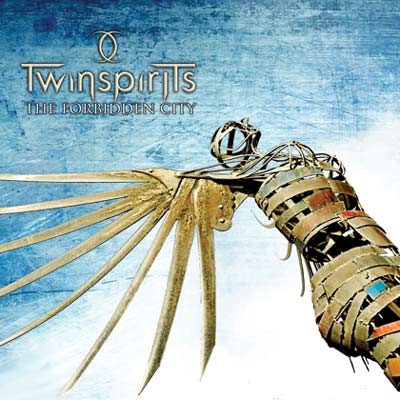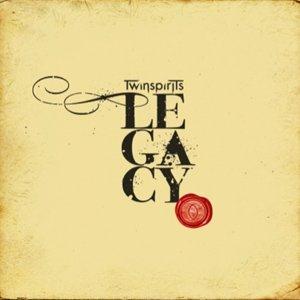|
Interview Daniele Liverani: “I've always been attracted by the big operas of the great composers from the past” (February 2013, text by Pedro Bekkers, edited by Peter Willemsen) The Italian guitarist Daniele Liverani is a master in a large number of musical styles, especially progressive rock and metal. Liverani received a classical piano education in his teens, but at the age of seventeen the electric guitar became his second passion. On this instrument he started to make demos that eventually resulted in his first solo album called Viewpoint (1999). In 2012, his latest album Eleven Mysteries (see review) appeared. This was for Background Magazine a good reason to do an interview with this great musician. I'm grateful for the time Daniele Liverani took to give me a number of extensive answers to my questions. They give a nice insight view of what's going on in his mind and of all the stories inside his head (PB). When did the music virus catch you and what kind of musical training did you receive? Daniele Liverani: “I think I was definitely born with a musical virus. As far as I can remember music has always been a great part of my live. I started to study classical music on piano at the age of six. Those early years in my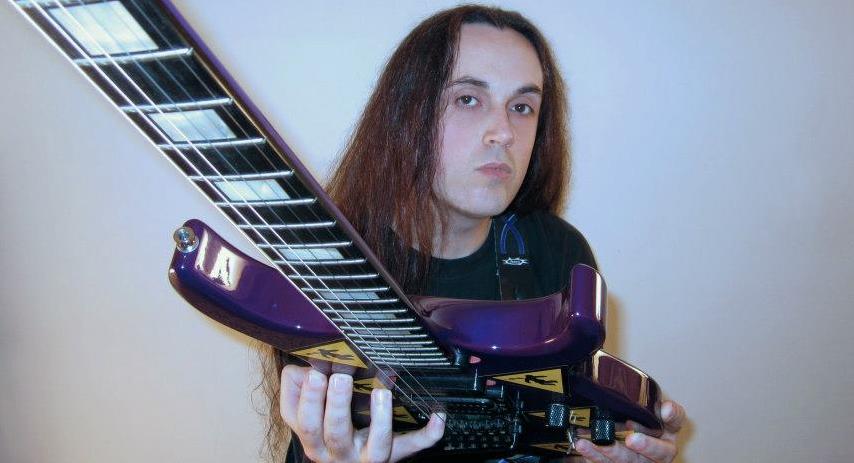 musical journey provided me so much theory and technical notion about music. So
when I started to play guitar at the age of sixteen, which is relatively late,
I could apply all the classical knowledge I learned from my piano education. As
far as guitar playing is concerned I'm an autodidact, but I think that the
piano lessons and the classical approach were the keys that really allowed me
become a self-taught man. At the age of twenty-two I won a national contest
being the best Italian guitar player. The award was a paid journey and a
teaching practice at the GIT-school in Los Angeles. I stayed in LA for a
certain period of time and it was there that I put together the line-up to record my first solo project album
Viewpoint
that was released in 1999. Later on I began to learn myself playing the bass guitar and the drums since I always
had a great interest in rock and metal music and for all the instruments involved in it.”
musical journey provided me so much theory and technical notion about music. So
when I started to play guitar at the age of sixteen, which is relatively late,
I could apply all the classical knowledge I learned from my piano education. As
far as guitar playing is concerned I'm an autodidact, but I think that the
piano lessons and the classical approach were the keys that really allowed me
become a self-taught man. At the age of twenty-two I won a national contest
being the best Italian guitar player. The award was a paid journey and a
teaching practice at the GIT-school in Los Angeles. I stayed in LA for a
certain period of time and it was there that I put together the line-up to record my first solo project album
Viewpoint
that was released in 1999. Later on I began to learn myself playing the bass guitar and the drums since I always
had a great interest in rock and metal music and for all the instruments involved in it.”Which of all the instruments you play are your favourite? “Well, as I said, the piano was my very first start as a child, and at the time that was my favourite instrument, but at the age of sixteen I was introduced to the rock scene, and at that point I realized that the guitar was also a great emotional and expressive instrument. So those two instruments have become my main instruments until now. I switch from one to the other depending on the projects. So I've got no real favourite instrument; both the guitar and the piano are very important and I feel comfortable playing both.”Would you please tell us about your time in the band Empty Tremor and the albums you recorded with them? “From 1993 until 2006 Empty Tremor was my main band and we recorded three albums. It was a great time, really exciting and I have many fine memories of those years. Especially the early years were full of hard work and great passion. I think you can hear it on the albums we recorded. I'm very proud of Apocolokyntosys (1997), Eros & Thanatos (2000) and The Alien Inside (2003). We even succeeded in supporting Dream Theater three times during the Train Of Thought tour in 2004 in Italy. That really was a dream came true!”You're a great keyboardist, but why are your solo albums focussed on guitar and not keyboard orientated like for instance the albums of Derek Sherinian or Bob Katsionis?
You did a great progressive trilogy called Genius. How did this happen and how did you get all the names working with you? “Well, as all the ideas that I'm working on for many years, the concept was inspired by a small detail, namely the sound of an old mechanical ring of a clock. I heard a strange and irregular beat sequence in this ring and from there I started to create a kind of story that would be connected to this sound. I began to think that this sequence could have been a sort of special password to be admitted into a parallel dimension. Then I came up with the idea of the 'dreams factory dimension', and I started to create all the characters and an amazing adventure that could support these basic elements. Hence this concept describes a sort of mind trip in a parallel dimension of the main character Genius. By chance he discovers the way to enter the dreams creation world. The irregular beat of his clock was similar to the sequence for being admitted in that dimension, used by the newborn twin spirits. All the dreams are being conducted by the Dream League that takes care of creating human fantasies while they're asleep. Every time a human starts to dream in this parallel dimension, a twin spirit is created for conducting his dreams and fantasies and once the human awakes this twin spirit is gone. Genius (Mark Boals), being admitted into this realm while he was dreaming, has the chance of meeting his assigned Twinspirit (Daniel Gildenlow), creating a sort of paradox that would cause serious problems to the whole dream's world safety. The entire trilogy is then running around all the adventures that Genius and his assigned Twinspirit will experience during the time of Genius' dream. Actually, I wrote the story concept I used for the Genius trilogy many years
With Cosmics your music slightly changed to fusion. Do you like fusion and who influenced you with this style? “Well, I would call it progressive metal fusion; The Cosmic Year contains many heavy metal influences. Although my favourite style is strongly related to progressive metal, I basically listen to all styles of music. I like to challenge myself in writing more keyboard-orientated with a fusion touch. I had the concept for The Cosmic Year album already in mind for a while and I decided to write it in an instrumental way with a line-up that could provide a fusion-rock touch to the songs. I was lucky enough to convince Virgil Donati, Rufus Philpot and Tommy Ermolli to play on the album and I'm very happy with the result. Cosmics is a unique step in my productions I think it differs from my usual productions. It was a different approach of arranging, writing and producing music.”Other projects are Khymera and Prime Suspect. Are these projects related and why did you choose melodic rock? “The Khymera and Prime Suspect albums have been a way to express my passion of hard rock and AOR. Even those styles aren't my favourites as a composer I've always been a hard rock and AOR devotee. I had the opportunity to produce the Khymera albums for Frontiers and to work with great singers like Steve Walsh and Dennis Ward, so I accepted the challenge. The songs of the third Khymera album were written by external songwriters, so I did only the arrangements and the production and I played the keyboards on those albums. After the experience of producing these three albums I decided to go further in challenging myself by writing songs in the AOR and hard rock style, and that's how Prime Suspect was born. In that new environment I also did the songwriting thus trying to be involved completely in the creative aspect of the album. It was great to write those songs and to approach an AOR-hard rock style, something different from what I've always done on my prog metal albums.”
Would you please tell us something about the solo albums you made and especially your latest release? “So far I recorded three guitar albums: Viewpoint (1999), Daily Trauma (2004) and Eleven Mysteries (2012). In my opinion these albums differ a lot, because they reflect the evolution process of writing compositions and guitar playing over the years. Viewpoint was written and produced back in 1993-1994, but only released in 1999. It contains more rock riffing pieces; the songs are much easier in terms of style. Daily Trauma contains more progressive influences and the music is more elaborate. I've already told you about it in the question about the Genius saga. Eleven Mysteries (see review) is my latest guitar album released in the summer of 2012. It's an eleven-track instrumental concept album dealing with the many readings and analysis I did recently with various books on ancient and modern philosophy and arguments regarding life. It concerns mostly books about ancient, mysterious and glorious past civilizations of different great writers and philosophers of many cultures. From these readings I extracted some of the basic and most interesting concepts that draw my attention regarding life approach, life principles and spiritual concepts. I tried to organize them in one big musical journey. All the songs deal with some of the most important moments and aspects of our lives, all the experiences that we're all going through during our life time and the mysterious aspects that are often hidden behind these experiences, choices, life styles and life events. From these experiences we all learn a lot and we possibly express them to others, like art and music for example. That's basically the principal aim of the concept of this album: an attempt to express and share some of the most interesting and mysterious concepts, trying to transform them in music that could express the meaning of those messages.”In recent years Twinspirits have released three albums. Could you tell us about this band or project? “I put together the Twinspirits episode back in 2004. The aim was to have a line-up that could continue with albums and new music that could be performed live. That's one of the main reasons why Twinspirits was born. The band consisted of great musicians whom I met over the years including Dario Ciccioni, who actually played drums on the Genius saga, Tommy Ermolli, Alberto Rigoni and Goran Nystrom, a singer from Sweden, although the first album The Music That Will Heal The World (2007) was sung by the Danish singer Soren Adamsen, who left after this album. Goran sung on the other two albums The Forbidden City (2009, see review) and Legacy (2011, see review). Twinspirits' style is progressive metal. For this band you can hear my natural songwriting approach. We did a couple of video clips and lots of shows back in 2008-2011.”
You have worked with great talents like guitarist Tommy Ermolli and bass player Alberto Rigoni. How do you see their future and are you coaching them? “It was great to work with such fine musicians, but I've never been a coach or a teacher for them. They had their own personal learning process and when we started to collaborate we just did it for the music. I think their future will look bright since they're very interesting musicians.”If you have any new forthcoming projects, now is the chance to tell us about it! “Well, currently I'm working on two new albums. One of them is a guitar album that I've already written. I'll start to record this album in the summer of 2013. It will feature Simon Ciccotti on drums, Marco Zago on keyboards and Nicolo Vese on bass. The other album is a new trilogy concept saga; I've just started to write the songs for it, so I'm in the early stage of the process. It's something that will keepme busy for a long period of time; it will be finished after the next guitar album. Its musical style will be similar to Genius, but the story and the concept differ of course. Unlike the Genius trilogy this one's more like a real story. So I've got a lot of stuff going on!” Thank you for extensively answering all my questions! Website Daniele Liverani samples Website Empty Tremor review album 'Fantasia' review album 'Eleven Mysteries' review album 'The Forbidden City' review album 'Legacy' |
